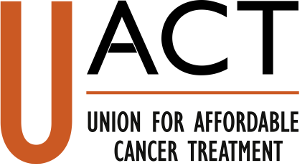On Friday, 20 January 2017, thanks to the support of the Shuttleworth Foundation flash grant, the Union for Affordable Cancer Treatment (UACT) in collaboration with Knowledge Ecology International (KEI) hosted a technical workshop on proposals for a Cancer Innovation Fund (CIF). The half day meeting was held at the World Council of Churches (WCC), from 9AM to 1PM.
The meeting itself with a discussion of the burden of disease and the challenges of providing “access to medicine for all,” followed by a presentation of the Cancer Innovation Fund, first as a concept, to expand access to new drugs for cancer, and then as two possible implementations, (1) Europe, or (2) a group of like minded countries, collectively with a large enough market to induce entry by generic suppliers.
Here is the agenda of the meeting:
9 AM-10 AM Panel 1: Burden of the disease and Disparities
Manon Anne Ress, UACT, Moderator
André Ilbawi, MD, WHO. The burden of disease and disparities of access for cancer, overview of the data.
Leena Menghaney, UACT. A view from India
Diarmaid McDonald, Just Treatment. The situation in the UK
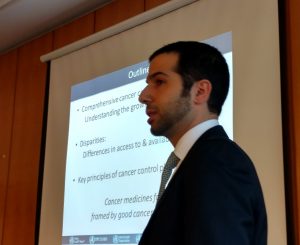
10:30 AM- 12 PM Panel 2: Mechanism of the Cancer Innovation Fund and Proposals for Implementation
Thiru Balasubramaniam, KEI Europe, moderator
James Love, KEI. The Cancer Innovation Fund, a proposal to implement the delinkage of R&D costs from drug and vaccine prices, for cancer.
Respondents: Esteban Burrone, the Medicines Patent Pool and Comments from meeting participants
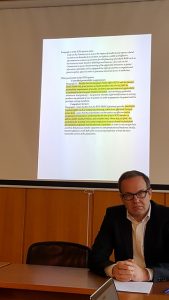
12 PM-1 PM Panel 3: Next Steps
Tido von Schoen-Angerer, MD. Moderator
Initial comments:
Ambassador Guilherme Patriota – Brazil
James Love – KEI
Julia Reda, MEP
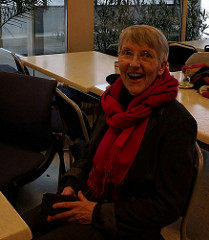
The participants had access to documents that were the Background on the Cancer Innovation Fund proposal starting with the 2008 proposal:
In 2008, Barbados and Bolivia made a one page proposal to the World Health Organization titled: “Cancer Medicines and Vaccines in Developing Countries Prizes as a Reward Mechanism for New Cancer Treatments.” http://keionline.org/misc-docs/b_b_igwg/prop4_cancer_prizes.pdf
The following is taken from the 2008 proposal:
Developing countries are facing an increase in health problems associated with cancer. New cancer treatments are priced far too high for the majority of people living in developing countries.
This is not a proposal for a global prize fund. Rather, it is a proposal that national governments in developing countries introduce a new system of rewarding the development of new medicines and vaccines for cancer. Specifically, the proposal is that developing countries de-monopolize the entire sector of medicines and vaccines for cancer, and permit free entry by generic suppliers. In return for ending the monopoly, the governments should agree to provide a domestic system of rewards for developers of new medicines and vaccines for cancer that is funded as a fixed proportion of one of the following possible bases:
The national budget for cancer treatments,
The national budget for the purchase of cancer drugs,
The national budget for healthcare, or
Some other base.
The WHO should evaluate the underlying need for access to medicines and vaccines for cancer, and determine if the pricing of new products is consistent with sustainable access for all. A meeting should be held in April 2009 to consider new business models for rewarding developers of new medicines and vaccines for cancer, specifically including proposals that would replace monopolies on new medicines with a system of rewards linked to improvements in health care outcomes. This discussion should compare the returns to the developers of new products under the existing approach and under the new proposal, and also consider the impact of the proposal on access and outcomes in developing countries.
This proposal is responsive to WHA60.30.
The 2009 proposal was also available.
In 2009, Bangladesh, Bolivia and Suriname offered a three page proposal titled: “Prizes as a Reward Mechanism for New Cancer Treatments and Vaccines in Developing Countries” http://www.who.int/phi/Bangladesh_Bolivia_Suriname_CancerPrize.pdf
The 2009 BB&S proposal was an elaboration on the 2008 B&B proposal. This is from the 2009 submission:
Specifically, the proposal is that developing countries de-monopolize the entire sector of medicines and vaccines for cancer, and permit free entry by generic suppliers. In return for ending the monopoly, developing country governments would offer to provide a domestic system of rewards for developers of new medicines and vaccines for cancer that is based on a fixed percentage of the national budget for cancer treatments.
Sustainability of Prize Fund
By tying the funding of the reward system to the size of the cancer treatment budget, developers of new medicines would be assured that the funding of the prize fund would be sustainable. By giving developing countries access to new cancer drugs at generic prices, developing countries would have greater incentives to expand budgets for cancer treatment, providing larger prize funds for developers of new medicines and vaccines.
Rewards from the Prize Fund Prize funds to reward new medicines and vaccines for cancer treatment should include the following features:
Rewards should be related to the impact of inventions on health care outcomes in the developing country funding the reward.
In order to build research capacity in developing countries, part of the prize fund rewards should be set aside for researchers working in developing countries.
In order to accelerate scientific progress and to reward openness and collaboration, some of the reward money should be shared with unaffiliated scientists and engineers that openly published and shared research, data materials and technology. This would include research, data, materials and technology that were either placed in the public domain, or subject to open, nonremunerated licenses.
Relationship of Cancer Prize Fund to International Intellectual Property Agreements
This proposal is consistent with international obligations concerning intellectual property rights. Countries have obligations under the 2001 Doha Declaration on TRIPS and Public Health (the Doha Declaration) and the WHO Global Strategy on Public Health, Innovation and Intellectual Property Rights (the Global Strategy), to implement intellectual property rules to promote access to medicine for all. Developing countries can have recourse to a number of flexibilities under the WTO TRIPS Agreement, for example they can eliminate the exclusive rights to use patented inventions, in cases where patent owners receive remuneration or compensation. These flexibilities include Articles 30, 31 and 44 of the TRIPS Agreement. This can include an alternative reward mechanism, such as the one described above.
A note on discussion of the Proposals in Europe was circulated.
In several meetings in Europe, a Cancer Prize Fund or Cancer Innovation Fund was proposed as a more appropriate way to reward developers of new cancer drugs, given the significant differences of income within European countries, particularly relating to the disparities of incomes and access to new medicines between Eastern and Northern Europe.
One proposal, in 2014, was for EU wide EU wide Cancer innovation fund. This proposal including the following features:
- De-monopolize cancer drugs
- Put 10 percent of treatment budget (estimated at 15.7 billion) into an innovation fund
- Provide 7 billion euros annually for grants for cancer research (push funding)
- Provide 6 billion euros annually for end product prizes
- Provide 1 billion euros annual for open source dividends
- Provide 1.7 billion euros annual for milestone prizes
- Role of Europe as supplier of innovation, under delinkage model
- Greater reliance upon grants enhances role of universities and SMEs in supplying innovation
- De-Emphasis of marketing monopoly, creates more competitive opportunities for SMEs in manufacturing and distributing
- New inventions can be patented, and patents can be fully exploited in foreign countries
The discussions in Europe also included proposals to implementing the Cancer Innovation Fund through plurilateral agreements, with “one or more countries with a large enough market to induce entry by generic manufacturers” that would “create a plurilateral cancer innovation fund” resourced by “5 to 10 percent of treatment budget to fund innovation, through mix of push and pull funding mechanisms.”
The January 20, 2017 meeting explored the feasibility and and suggested updates for these earlier proposals. The meeting was followed by the WHO Executive Board where a resolution on cancer was proposed. On January 31, 2017, a text of the proposed resolution was available. It included the following provision in bracket to be discussed at WHA in May 2017:
(OP2.5ter) [to conduct a [preliminary] (Brazil) feasibility study of creating a multi-country push and pull fund for cancer R&D, as an alternative to incentives-based intellectual property rights and/or regulatory monopolies and to progressively delink cancer R&D costs from product prices;] (India)
The goal of the January meeting was twofold: to push for a cancer research fund feasibility studies as in (OP2.5ter) in a cancer resolution at the WHO and to meet face to face with UACT potential board and members face to face.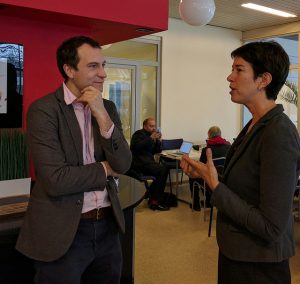
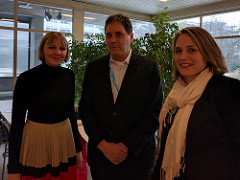
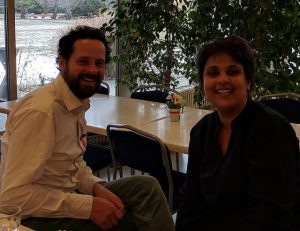
Diarmaid McDonald, Just Treatment.
